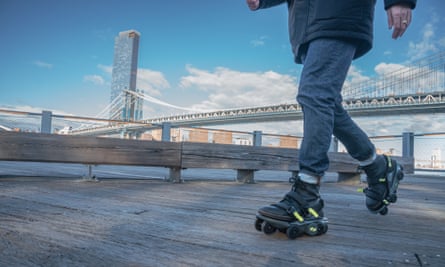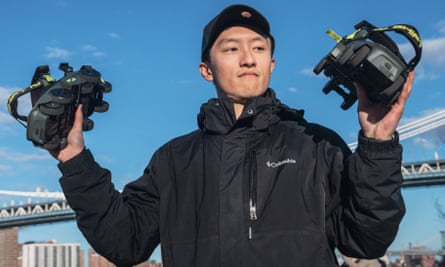
Walking is all right, isn’t it, but it’s a bit slow. A bit ponderous. Wouldn’t it be good if you could walk, but, like, go faster? That is the premise of Moonwalkers: a pair of wheeled shoes that promise you can walk at running speed, without any of the effort of actually running. “Walk how you usually do, and our AI adapts to you,” reads the website blurb. “It’s not skating; it’s genuinely walking, so no new skills are necessary to learn.”
The Moonwalkers sounded perfect. I don’t like learning new skills, but I do like the idea of going faster while putting in zero extra effort. That was enough. On a cold winter afternoon, I meet up with Joseph Yang, the lead software engineer on Moonwalkers at Brooklyn Bridge Park in New York City, looking out across a swirling Hudson River. Yang, 26, pulls a pair of the vaunted Moonwalkers out of a canvas bag and sets them on the ground.
They look like a cross between the Fisher-Price roller-skates that children were subjected to in the 1980s and the daft sandals that men sometimes wear. But they’re black, which matches my boots, and they have some snazzy yellow highlights that add a bit of fun to proceedings. Under Yang’s direction, I strap the Moonwalkers on over my shoes and clomp about for a bit, bending my knees and lifting my feet up and down. The shoes are quite heavy and it’s like yanking my feet out of mud. I’m a bit skeptical.
“Feel the weight and the bulk of it, get used to it,” Yang says. He’s watching patiently as I strut about, feeling the shoes’ heft.
“OK, it’s very simple,” Yang says. “Look ahead so you will have a good balance and then just walk. The harder you push off the ground, the faster it goes.”
I do as I’m told, gingerly stepping forward. I went to a roller disco once, so I’m aware of the inherent treachery of wheeled footwear. Yang senses my reticence and tells me to get a move on. I gangle forward a bit. The wheels aren’t spinning wildly, like they did when I bruised my coccyx at St Teresa’s Parish Hall in 1998. They start moving, slowly. I keep walking and then … it works. I’m strolling slowly, but I’m going fast.
The shoes, which are basically what happens when you put an engine in some roller-skates, are great. When I’m wobbling backwards, a motor slows down the 10 wheels on the sole, propping me back upright. When I unintentionally tip forwards, the wheels seem to accelerate a bit and I don’t end up falling over.
Within minutes, I’m hightailing it up and down the boardwalk under the Brooklyn Bridge. I’m strolling gently, but I’m travelling – according to Yang – at 250% of my usual walking speed.
It’s a revelation. I’m flying. I’m like the Linford Christie of walking quite slowly. Why have I spent all this time walking normally, like an idiot? I think of all the hours I’ve wasted in my life. I could have learned to paint. I could have been a more attentive partner. Maybe there was time to write that novel about space-robots.
Then, as the glass wall of the Brooklyn Bridge carousel looms into view, I realise I don’t know how to stop. There’s a moment of panic. I’m not in a family-friendly comedy romp. I don’t want my face smushed up against a glass frontage.

“Just take smaller steps,” Yang shouts, sensing the danger. I didn’t realise he’d been jogging behind me. I try to take smaller steps and the Moonwalkers realise it and slow the speed of the wheels. Unfortunately, I don’t realise they’re doing that, and I lurch forward into the kind of ungainly trot I’ve seen my sister perform when she’s been walking too quickly in high heels.
The developers of Moonwalkers, Shift Robotics, are very keen that they should not be called roller-skates. There’s no freewheeling, so, unlike roller-skates, there’s no risk of being involuntarily propelled off into the horizon. The shoes sense when to speed up or slow down, and, with a bit of practice, you can control the pace by thrusting down harder or more gently with your toes.
Moonwalkers are the brainchild of Xunjie Zhang, the CEO and founder of Shift Robotics. He came up with the idea when he nearly got knocked off his electric scooter on his way to work. “At that moment I started realising that even though it’s just half an hour’s walk away, I never really walked,” Zhang said. “I can walk on the sidewalk, which is safer than anywhere on the street, it’s great exercise for me, but I’ve never done that.”
Zhang said that the thing that put him off walking was that “it’s just way too slow”. An idea was born. “I thought, what if we start empowering, augmenting, enhancing the ability of walking so that you will be able to go much faster, more efficiently, but still in a safe, convenient manner?” he said.
Four or five years later, after multiple designs and prototypes, Zhang and his team launched a Kickstarter campaign for Moonwalkers. They set the fundraising goal as $90,000, but ended up raising $329,409, with 500 people pledging to buy themselves a pair. The company will ship that first batch of Moonwalkers in spring 2023, Zhang said, before they go on general sale in the summer, priced at $1,399 (£1,150).
They’re not cheap, but Zhang said interest has been high. Originally, Moonwalkers were envisaged for people in metropolitan areas, who have “that first or last mile to go”, after taking a train or bus. But Zhang has been surprised by the number of people who want a pair just to exercise, and to be able to walk further than they could unaided.
That’s all well and good, but what do the general public think? At Brooklyn Bridge, I’m 30 minutes into my trial – the battery on Moonwalkers only lasts about an hour – and scooting past two women who look at me and my shoes, with a cross between interest and amusement.
“Do I look cool?” I shout, as I whiz past. I’m still not very good at stopping, so I have to carry on for another 30 metres before I can turn around and come back for the answer.
“Yeah, kind of,” one of the women says.
I don’t get any more than that. I’m long gone. I’m a wheeled phenom, zipping along with abandon. I’ve moved past having to have my arms out for balance, and have adopted a bent-at-the-elbows, fists-pumping-to-the-chest approach, like a sergeant major striding across an army base. Eventually, though, the fun has to end. I unstrap the Moonwalkers and hand them back. I’ve been tooling around on them for an hour, and my first non-wheeled steps feel like stepping off a moving walkway at an airport. It’s back to regular, non-augmented, non-enhanced walking. Shuffling. Plodding. Trudging.
Is moonwalking the future of pedestrianism? I don’t know. The shoes are very expensive. Wearing them out in the wild feels like a bit of a techie statement that I’m not sure I’m prepared to make. They definitely didn’t enhance my outfit, and, thinking back, I’m not convinced that woman did think I looked cool.
But they’re pretty fast, and they save energy and time. Maybe they’ll help people exercise more. If everyone was moonwalking about city centres, there would certainly be less congestion. And, on a more base level, they’re fun. Ultimately, shouldn’t that be the point of anything? I think so.



